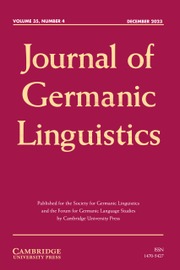No CrossRef data available.
Article contents
Evidence for sk in German as a Complex Segment
Published online by Cambridge University Press: 07 February 2020
Abstract
This squib provides evidence from the superlative in support of Wiese’s (1996) position that s (sibilant) + stop sequences in German behave as complex segments. With the exception of the sequence /sk/, the consonants that require schwa epenthesis before the superlative suffix are all coronal obstruents: nettest- [ˈnɛtəst] ‘nicest’, süßest- [ˈzyːsəst] ‘sweetest’, frischest- [ˈfrɪʃəst] ‘freshest’, brüskest- [ˈbrʏskəst] ‘most abrupt’. If one assumes that the sequence /sk/ is a single, complex segment with the feature [coronal] as well as [dorsal], the formation of the superlative can be accounted for with a simple rule of schwa epenthesis.*
- Type
- Squibs
- Information
- Copyright
- © Society for Germanic Linguistics 2020
Footnotes
I would like to thank the anonymous referees for JGL for their useful comments on earlier versions of this squib.


